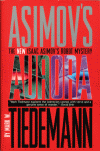
I’m not sure why, but I have just got around to reading 1984. For some reason it was never required reading for me in high school. I was familiar with the “Big Brother” concept as it is a very common reference. Recently, the Patriot Act of 2001 and subsequent reauthorization in 2005 has been criticized by many. For me, 1984 was a very interesting read, because a lot of George Orwell’s concepts seem very plausible today.
I can’t really emphasize enough how important it is to read the Appendix of 1984 first. It covers the official government language of Oceana. This is called “Newspeak,” and is designed to simplify the English language and control human thought. As a quick example, there is no word for bad, just ungood. Excellent would be replaced by something like doubleplusgood. Another important word central to the plot is doublethink, or the ability to hold two contradicting ideas in one’s mind and truly believe both.
The story takes place in Oceana, one of three superpowers that is always at war with either Eastasia or Eurasia. The Party controls all information and feeds political propaganda to the public and keeps the public under constant surveillance through telescreens which act as both televisions and video cameras. The main character, Winston Smith, works for the Party in the Ministry of Truth.
The description of the Ministry of Truth was very scary. Essentially it is responsible for storing all information and knowledge, and subsequently can modify any of it to suit its own purpose. For example, Oceana can swith alliances with one of the other two superpowers, and all of historical information would be changed. Winston’s job is to modify records to match Party policy whenever changes or errors are made. He secretly despises Big Brother and the Party, and is eventually approached by a woman named Julia who shares his feelings. They eventually become lovers, but Winston is a bit concerned. She does not seem to be as aware of the political brainwashing as he is.
It was rather more of a shock to him when he discovered from some chance remark that she did not remember that Oceania, four years ago, had been at war with Eastasia and at peace with Eurasia. It was true that she regarded the whole war as a sham: but apparently she had not even noticed that the name of the enemy had changed. ‘I thought we’d always been at war with Eurasia,’ she said vaguely. It frightened him a little.
They eventually make contact with O’Brien, a secret member of an underground resistance. He warns them that they will get caught eventually, and they will confess (under torture), and for that reason their knowledge of who are members will be kept to the absolute minimum. They are given “THE BOOK” which contains the musings of Goldstein, the leader of the resistance. The excerpts that Winston reads describe some very morbid ideas about war, which are very interesting. There are quite a few other tidbits in there as well.
Orwell’s 1984 is very deep and thought provoking. If anything, it is more relevant today, than when it was published in 1949. Technology is advancing at an alarming rate. Within the last few years, the FBI obtained warrants to wiretap cell phones of mobsters under investigation. This might seem innocuous, but the technique they used was able to activate the microphone on the phones remotely without a call being placed, and might have been possible to record conversations near the phone while it was turned off! Just recently, in The Dark Knight, Bruce Wayne develops a technology that ties into cell phones to create a much more elaborate surveillance system. How long it will be until something like that is possible?
I’m partial to reading physical books, but if you like to read ebooks, 1984 is available at Project Gutenberg.




This storyline brings up a very interesting point…settling other worlds will eventually lead to evolution of new species of human that would eventually not be able to breed with each other. I can’t wait to read the last book in this series and see how the robots handle this issue regarding the three laws and their obligation to serve humans.